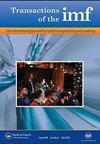Electrodeposition of Copper-Nickel Alloys from a Citrate Bath Containing Boric Acid
IF 1.5
4区 材料科学
Q4 ELECTROCHEMISTRY
Transactions of The Institute of Metal Finishing
Pub Date : 1999-01-01
DOI:10.1080/00202967.1999.11871292
引用次数: 4
Abstract
Copper-nickel alloys have been electrodeposited on steel substrates from a bath containing copper sulphate, nickel sulphate, sodium sulphate, sodium citrate and boric acid. Galvanostatic cathodic polarization, cathodic current efficiency and composition of the alloys were studied as influenced by bath composition, current density and temperature. The bath is characterized by high cathodic current efficiency. Current density is found to strongly influence the composition of the deposits. At low current densities (lower than a certain transition current density), a copper-rich alloy is deposited with copper (the more noble metal) being the preferentially deposited metal. At larger current densities, nickel becomes the nobler metal and is deposited preferentially. The magnitude of the transition current density depends upon the bath composition and temperature. The structure and surface morphology of the as-deposited alloys were examined by XRD and SEM. The results reveal the presence of single solid solution phase with face centred cubic structure. The morphology of the deposits is mainly controlled by the alloy composition.含硼酸柠檬酸浴中电沉积铜镍合金的研究
铜镍合金已在含有硫酸铜、硫酸镍、硫酸钠、柠檬酸钠和硼酸的镀液中电沉积在钢基体上。研究了镀液成分、电流密度和温度对合金恒流阴极极化、阴极电流效率和合金成分的影响。该电解槽具有阴极电流效率高的特点。发现电流密度对沉积物的组成有很大的影响。在低电流密度(低于一定的过渡电流密度)下,富铜合金被沉积,铜(更贵重的金属)是优先沉积的金属。在较大的电流密度下,镍成为较贵重的金属,并优先沉积。跃迁电流密度的大小取决于镀液成分和温度。采用XRD和SEM对合金的结构和表面形貌进行了表征。结果表明,存在面心立方结构的单一固溶相。镀层的形貌主要受合金成分的控制。
本文章由计算机程序翻译,如有差异,请以英文原文为准。
求助全文
约1分钟内获得全文
求助全文
来源期刊

Transactions of The Institute of Metal Finishing
工程技术-材料科学:膜
CiteScore
3.40
自引率
10.50%
发文量
62
审稿时长
3 months
期刊介绍:
Transactions of the Institute of Metal Finishing provides international peer-reviewed coverage of all aspects of surface finishing and surface engineering, from fundamental research to in-service applications. The coverage is principally concerned with the application of surface engineering and coating technologies to enhance the properties of engineering components and assemblies. These techniques include electroplating and electroless plating and their pre- and post-treatments, thus embracing all cleaning pickling and chemical conversion processes, and also complementary processes such as anodising. Increasingly, other processes are becoming important particularly regarding surface profile, texture, opacity, contact integrity, etc.
 求助内容:
求助内容: 应助结果提醒方式:
应助结果提醒方式:


